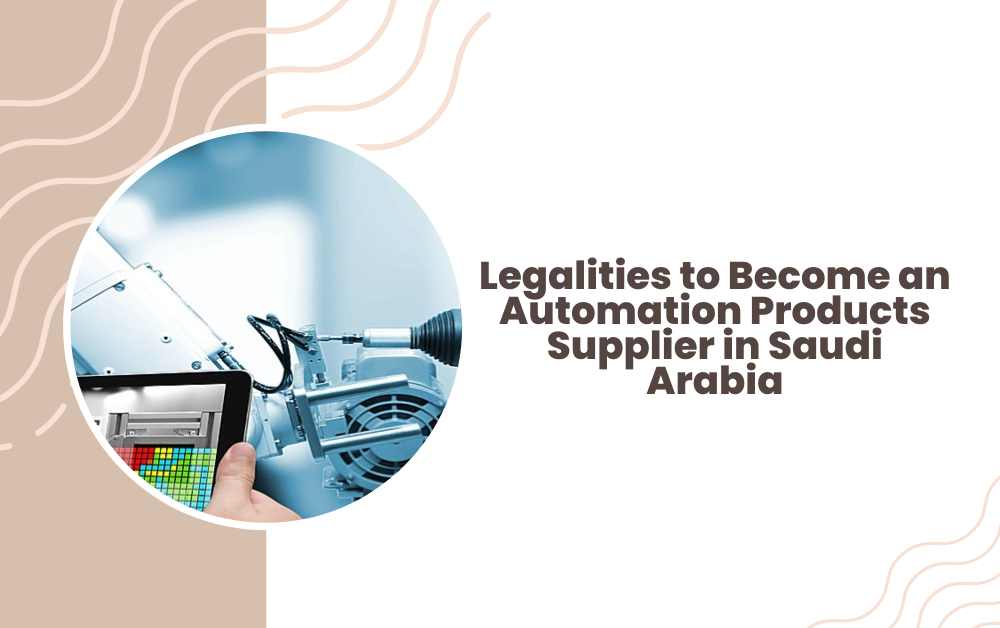
Introduction
Entering the automation market in Saudi Arabia presents significant business opportunities, but it also involves navigating various legalities and regulatory requirements. Ensuring compliance with these legalities is crucial for a smooth business setup and long-term success. This article explores the legal steps and regulations you need to follow to become an automation products supplier in Saudi Arabia.
Understanding the Business Environment
Saudi Arabia is actively promoting economic diversification through Vision 2030, which includes encouraging foreign investment and technological advancements. The automation industry is poised for growth, driven by demands in sectors such as manufacturing, oil and gas, healthcare, and logistics. However, to operate successfully in this market, it is essential to understand the local business environment, including legal frameworks and regulatory bodies. Familiarizing yourself with the business landscape will help you navigate the necessary legal steps more effectively.
Business Registration and Licensing
The first legal step to becoming an automation products supplier in Saudi Arabia is to register your business and obtain the necessary licenses. The Saudi Arabian General Investment Authority (SAGIA) is the primary agency responsible for issuing investment licenses to foreign businesses. To register your business, you must submit an application to SAGIA, providing details about your company, its activities, and the investment plan. Once approved, you will receive an investment license, which allows you to legally operate in the country. Additionally, you will need to register your business with the Ministry of Commerce and Investment (MCI) to obtain a commercial registration certificate.
Legal Structure and Ownership
Choosing the appropriate legal structure for your business is a crucial decision that affects your operations, taxation, and legal obligations. Common legal structures for foreign businesses in Saudi Arabia include Limited Liability Companies (LLCs), Joint Ventures, and Branch Offices. An LLC is a popular choice as it offers limited liability protection and allows for foreign ownership. However, recent reforms under Vision 2030 have made it easier for foreign investors to own 100% of their businesses in certain sectors. It is advisable to consult with legal experts to determine the best legal structure for your business and ensure compliance with ownership regulations.
Complying with Saudization Policies
Saudi Arabia has implemented Saudization policies, known as Nitaqat, to increase employment opportunities for Saudi nationals. As an employer, you must comply with these policies by hiring a certain percentage of Saudi employees. The required percentage varies based on the size and sector of your business. Failure to comply with Saudization requirements can result in penalties, including fines and restrictions on your business operations. It is essential to develop a hiring strategy that meets these requirements and to regularly monitor your compliance status.
Import Regulations and Standards
As an automation products supplier, you will likely need to import various products and components. Compliance with import regulations and standards is crucial to avoid delays and legal issues. The Saudi Standards, Metrology, and Quality Organization (SASO) sets the standards for products imported into the country. Ensure that your products meet SASO standards and obtain the necessary certifications. Additionally, the Saudi Food and Drug Authority (SFDA) regulates the import of certain electronic and medical devices. Familiarize yourself with the import regulations and work with reliable customs brokers to facilitate the import process smoothly.
Intellectual Property Protection
Protecting your intellectual property (IP) is vital to safeguarding your business interests and innovation. Saudi Arabia has made significant strides in strengthening its IP laws to align with international standards. The Saudi Authority for Intellectual Property (SAIP) is responsible for registering and enforcing IP rights, including trademarks, patents, and copyrights. Register your trademarks and patents with SAIP to ensure legal protection. Additionally, take proactive measures to monitor and enforce your IP rights to prevent infringement and unauthorized use of your products and technologies.
Contractual Agreements
Entering into clear and legally binding contractual agreements is essential for protecting your business interests. Contracts with suppliers, distributors, customers, and employees should clearly outline the terms and conditions, responsibilities, and dispute resolution mechanisms. It is advisable to seek legal counsel when drafting and reviewing contracts to ensure they comply with Saudi Arabian laws and protect your rights. Well-drafted contracts will help prevent disputes and provide a legal framework for resolving issues that may arise during your business operations.
Taxation and Financial Compliance
Understanding the taxation system and financial compliance requirements is crucial for running a successful business in Saudi Arabia. The General Authority of Zakat and Tax (GAZT) oversees the taxation system, including Value Added Tax (VAT) and corporate income tax. As an automation products supplier, you must register for VAT and ensure timely filing and payment of taxes. Additionally, maintain accurate financial records and comply with accounting standards. Engaging a local accounting firm can help you navigate the tax regulations and ensure compliance with financial reporting requirements.
Health, Safety, and Environmental Regulations
Compliance with health, safety, and environmental (HSE) regulations is essential for the well-being of your employees and the community. The Ministry of Human Resources and Social Development (HRSD) sets the occupational health and safety standards that businesses must adhere to. Implementing robust HSE policies and practices will help you create a safe working environment and avoid legal liabilities. Additionally, consider the environmental impact of your operations and products. Complying with environmental regulations and adopting sustainable practices will enhance your reputation and contribute to long-term success.
Building Relationships with Local Partners
Building strong relationships with local partners can facilitate your business operations and ensure compliance with local regulations. Partnering with local distributors, suppliers, and industry associations can provide valuable insights into the market and help you navigate regulatory requirements. Additionally, establishing a positive relationship with government agencies and regulatory bodies can enhance your credibility and streamline the approval processes. Networking and collaboration with local partners will strengthen your market presence and contribute to your business success.
Staying Updated with Regulatory Changes
The regulatory landscape in Saudi Arabia is evolving, with ongoing reforms and updates to laws and regulations. Staying informed about these changes is crucial to ensure continued compliance. Subscribe to updates from regulatory bodies, attend industry seminars, and engage with legal experts to stay updated with the latest developments. Proactively adapting to regulatory changes will help you avoid legal issues and maintain a competitive edge in the market.
Conclusion
Becoming an automation products supplier in Saudi Arabia involves navigating various legalities and regulatory requirements. By understanding the business environment, registering your business, choosing the appropriate legal structure, complying with Saudization policies, adhering to import regulations, protecting your intellectual property, entering into clear contractual agreements, understanding taxation and financial compliance, ensuring health, safety, and environmental compliance, building relationships with local partners, and staying updated with regulatory changes, you can establish a successful and compliant business. Following these legal steps will help you thrive in the growing automation market in Saudi Arabia and achieve long-term success.
Note :- To Read More Articles Visit on- incnewsblogs






